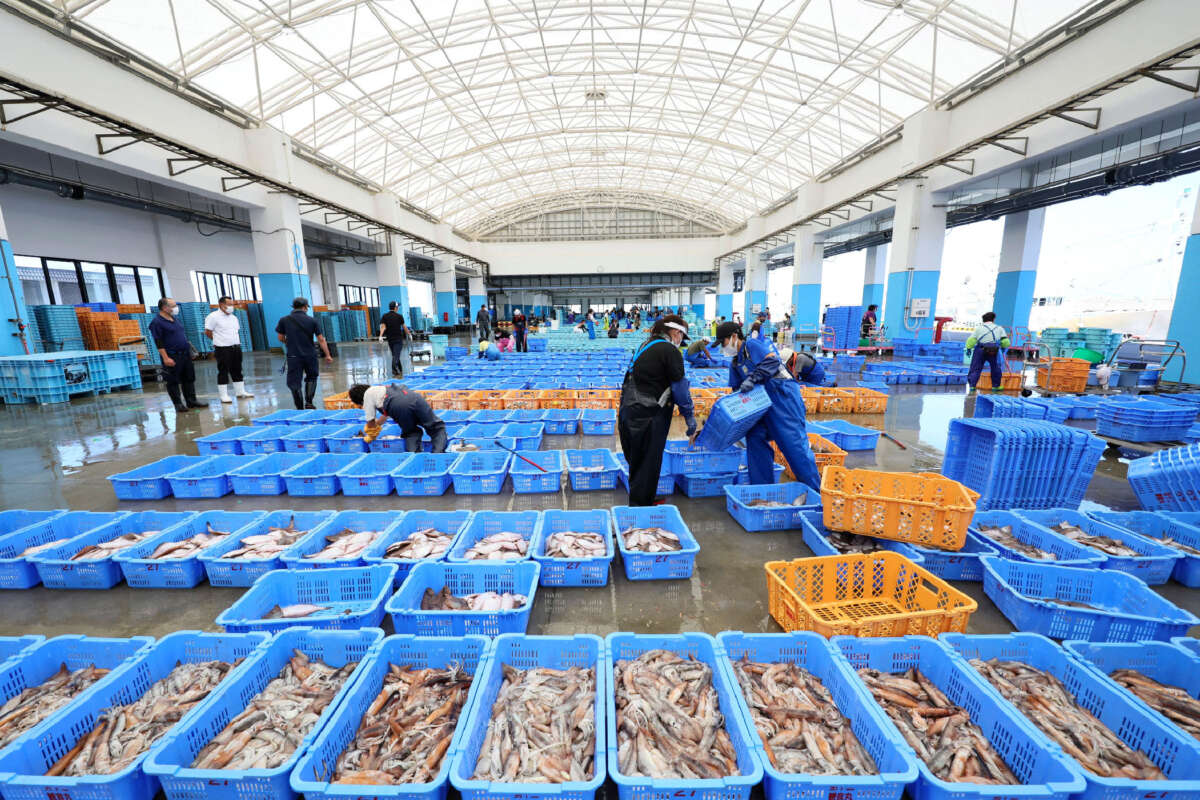Did you know that Truthout is a nonprofit and independently funded by readers like you? If you value what we do, please support our work with a donation.
During their first summit of the year on November 16, Japan’s Prime Minister Fumio Kishida urged Chinese President Xi Jinping to end China’s ban on imports of Japanese seafood imposed in response to Japan’s discharging of radioactive wastewater from the Fukushima nuclear plant into the Pacific, telling Jinping, “I want to work with you to create a brighter future for Japan-China ties for the sake of the next generation.”
The two leaders’ agreement to seek a resolution in the dispute comes after Ambassador to Japan Rahm Emanuel announced in October that the United States military will buy bulk Japanese seafood also banned by Russia and South Korea for U.S. service members stationed at military bases in Japan. About a month before the announcement, the Japanese embassy hosted a sushi-tasting event at the White House featuring seafood caught off the coast of Fukushima. G7 officials are now likewise calling for repeal on national bans of Japanese seafood.
The recent moves to try to greenlight Japanese seafood are going forward even as citizens and fishers from five prefectures in northeastern Japan filed a lawsuit demanding a halt to the Japanese government and Tokyo Electric Power Company’s (TEPCO) continued releases of Fukushima wastewater. The Pacific Island Forum’s 18 nations have likewise called on Japan to stop its wastewater discharges.
Black rockfish from a harbor in the Fukushima Prefecture tested this past summer had 180 times Japan’s acceptable limit of cesium as stated on TEPCO’s website. Moreover, nuclear energy education nonprofit Fairewinds Energy Education estimates that more than 70 percent of land in Fukushima Prefecture will never be decontaminated. As with mercury and other heavy metals, radionuclides, including cesium-137, strontium-90, iodine-131, bioconcentrate in both seafood and land-based food.
I worked for an environmental organization after the Chernobyl nuclear disaster of 1986, so when Fukushima’s triple nuclear meltdowns and quadruple explosions happened in 2011, I was alarmed. Chernobyl is still producing data showing illness nearly 40 years after its nuclear disaster began. Yury Bandazhevsky leads the European Commission-supported “Chernobyl: Ecology and Health” project in Ukraine. The project concluded that cesium-137 fallout at Chernobyl accumulates in organs and has genetic mutational effects.
So why is Fukushima seafood being promoted now? In July, the International Atomic Energy Agency completed its final report on the safety plan for dumping 1.3 million tons of radioactive wastewater in a process many firmly believe was incomplete and lacked transparency. In August, Japanese Prime Minister Kishida proclaimed seafood from Fukushima to be “safe and delicious.”
But scientists know it’s not safe. Japan’s process for treating the wastewater, the Advanced Liquid Processing System (ALPS), is controversial and has reportedly failed at least eight times in 10 years. Vitrification and cement storage are both viable alternatives to ALPS that were recommended by engineers and scientists but rejected by TEPCO.
Further, tritium and carbon-14 are just two of at least 62 radionuclides that have been found in Fukushima’s wastewater. They won’t be filtered at all, and the rest are highly questionable. Some have half-lives of thousands of years or longer. A compilation of 250 studies link cancer to the ingestion of tritium.
Nuclear fusion engineer Arjun Makhijani’s book, Exploring Tritium Dangers, makes an urgent case for establishing public health policy that has been historically overlooked. Moreover, women and girls are much more likely to be stricken with cancer from human-made radiation than men and boys.
The United Nations expressed “deep regret” in 2021 over Japan’s wastewater releases, stating it imposes considerable risk to human rights. Special Rapporteur on Toxics and Human Rights Marcos Orellana, Special Rapporteur on Right to Food Michael Fakhri and Special Rapporteur on Human Rights and the Environment David Boyd released a joint statement declaring that Japan’s “decision is particularly disappointing as experts believe alternative solutions to the problem are available.”
Back in the U.S., parents and radiation experts, including myself, filed a citizen petition with the Food and Drug Administration after learning that cesium-134 and -137 were detected in cow’s milk, Pacific Bluefin tuna, which migrate from Fukushima waters to California, and more. The FDA lifted all food restrictions on Japanese seafood in 2021.
President Joe and First Lady Jill Biden’s own experience in a military family who lost a son to cancer drives their commitment to honorable initiatives like the Cancer Moonshot, which aims to build a world where we prevent cancer before it starts. Their ambitious initiative is now at odds with a U.S. government contract to buy bulk Fukushima seafood for U.S. service members and their families stationed in Japan.
President Biden’s Cancer Moonshot and other admirable health initiatives strive to understand and prevent environmental exposures. We need to learn from hard lessons and crucial research to inform decisions, especially as concentrations of cancer continue to plague the U.S. public. There are certainly better options than providing seafood from a radioactive marine environment to U.S. service members and their families — or anyone else.
Press freedom is under attack
As Trump cracks down on political speech, independent media is increasingly necessary.
Truthout produces reporting you won’t see in the mainstream: journalism from the frontlines of global conflict, interviews with grassroots movement leaders, high-quality legal analysis and more.
Our work is possible thanks to reader support. Help Truthout catalyze change and social justice — make a tax-deductible monthly or one-time donation today.
